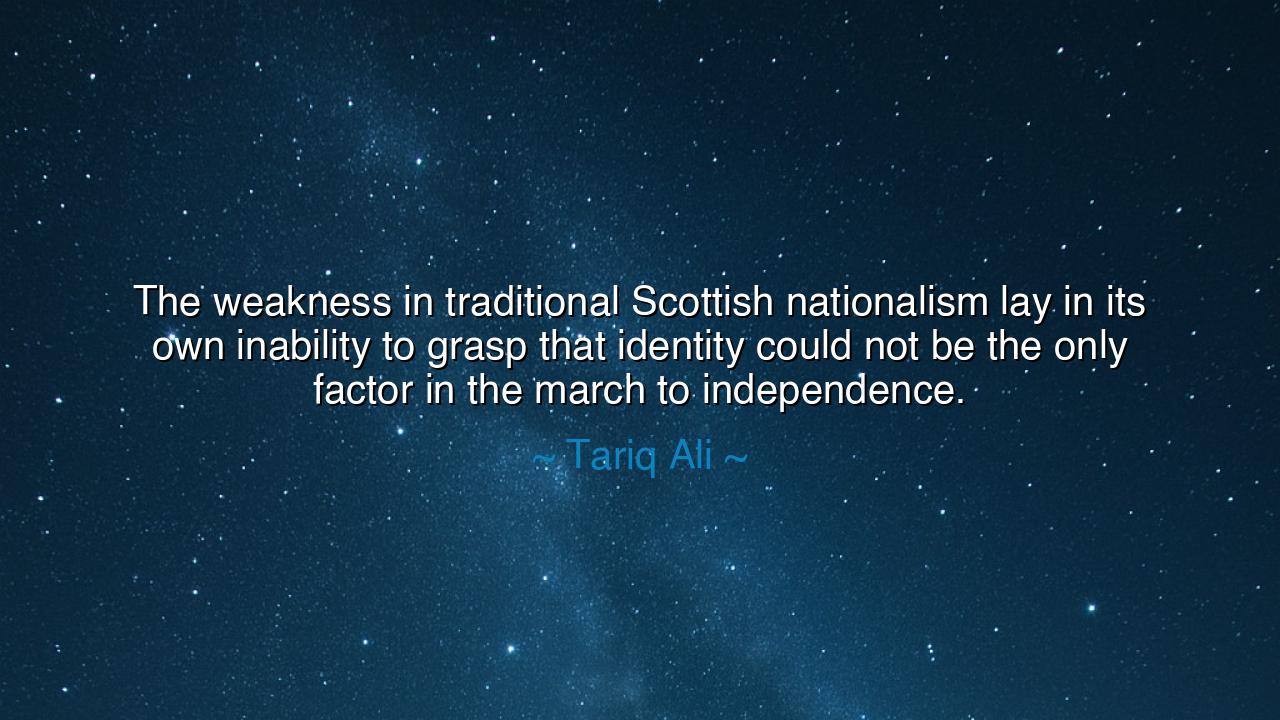
The weakness in traditional Scottish nationalism lay in its own
The weakness in traditional Scottish nationalism lay in its own inability to grasp that identity could not be the only factor in the march to independence.






Hear the reflective and piercing words of Tariq Ali, the thinker, writer, and historian of rebellion and revolution: “The weakness in traditional Scottish nationalism lay in its own inability to grasp that identity could not be the only factor in the march to independence.” In these words lies not merely a critique of a political movement, but a timeless truth about the nature of freedom itself. For independence, whether of nations or of souls, cannot rest upon pride of birth alone — it must stand upon vision, justice, and the power to shape a destiny worthy of that freedom.
The origin of this quote lies in the modern history of Scotland, a land of mountains and mist, of poets and warriors, whose spirit of defiance has echoed through centuries. For generations, Scots have wrestled with their place within the United Kingdom — torn between memory and modernity, between the call of national identity and the demands of political reality. Tariq Ali, writing in the twilight of the twentieth century, saw in the rise of Scottish nationalism both passion and peril. He admired the longing for self-determination, yet warned that the dream could not be sustained by identity alone. The banner of freedom, he said, must be lifted not merely by emotion, but by a vision of social transformation, by the promise of a better life for all.
His words recall an ancient truth that nations, like men, must be built not upon who they are, but upon what they strive to become. Identity is the flame that awakens the spirit, but it cannot alone build the hearth that shelters it. History is filled with examples of peoples who rose with the cry of belonging but faltered when called to govern. Revolution without purpose becomes noise; independence without justice becomes vanity. In Scotland’s struggle, Ali saw the same danger that has haunted movements throughout time — the temptation to believe that shared blood or language is enough to bind a people, when in truth it is shared hope and moral purpose that forge enduring nations.
Consider the story of Ireland, whose long road to independence was drenched in both triumph and tragedy. In the early years of its freedom, Ireland discovered that unity in resistance did not easily translate into unity in governance. The dream of nationhood, once won, began to fracture under the weight of political divisions, economic hardship, and competing visions of the future. So too did Tariq Ali caution the Scots: the journey to independence must not end at the border of identity, but press onward to build an economy of fairness, a society of equality, and a state that serves all its people — for only then does freedom become substance, not symbol.
The ancients knew this wisdom well. When Solon of Athens laid the foundations of democracy, he warned that laws without justice and purpose were but chains in disguise. He knew that true freedom demands both heart and reason — passion to awaken the people, and wisdom to guide them. Ali’s critique of Scottish nationalism springs from this same spirit: he does not reject identity; he seeks to elevate it, to unite it with vision. The march to independence, he reminds us, must not be a walk backward into nostalgia, but a step forward into the future — guided by ideas, compassion, and the will to transform society itself.
His words also hold a lesson for every nation and every person. For just as countries can mistake identity for destiny, so too can individuals confuse pride with purpose. To know who you are is noble; to know what you will do with that knowledge is divine. The weakness of any movement or life lies not in passion, but in the failure to direct that passion toward creation. Thus, the wise must ask not only, “Who am I?” but “What will I build?” and “For whom do I labor?” The answers to those questions give meaning to identity and make independence worth the struggle.
So let this be the teaching that endures: freedom without purpose is a mirage. A people cannot live on pride alone; they must build with justice, dream with discipline, and march with compassion. Identity is the seed — but without care, without soil, without sun, it cannot grow. And so, whether one speaks of Scotland or of any land, of a nation or of a soul, remember Tariq Ali’s wisdom: that the truest independence is not only freedom from others, but mastery over oneself — the power to use one’s liberty to create a world more just, more wise, and more humane than the one before it.
Thus, children of tomorrow, when you fight for your own freedom — personal, political, or spiritual — carry not only the pride of who you are, but the vision of who you must yet become. For in that union of identity and purpose lies the destiny of nations, and the greatness of humankind.






AAdministratorAdministrator
Welcome, honored guests. Please leave a comment, we will respond soon